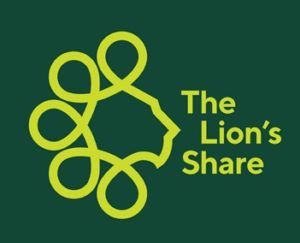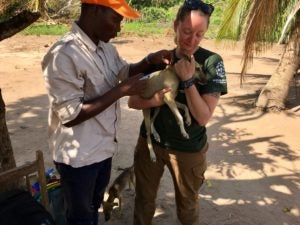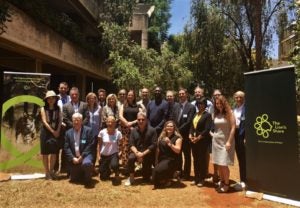
NAIROBI—The Lion’s Share Fund, a unique initiative raising much-needed funds to support wildlife conservation and animal welfare across the globe, has today announced its partnership with Humane Society International to deliver projects aimed at tackling animal welfare globally.
The Lion’s Share is an ambitious initiative, led by by a coalition of businesses, with founder FINCH and founding partner Mars, Incorporated, Clemenger BBDO and Nielsen, and the United Nations Development Programme, which aims to raise over $100 million per year within the next three years by asking advertisers to contribute 0.5 per cent of their media spend every time an animal is featured in an advertisement.
Ten percent of The Lion’s Share Fund will be invested in animal welfare projects across the globe to harness compassion for animals and translate it into increased care for nature, with HSI delivering on the global animal welfare programme. The programme includes community engagement to address the issue of street animals in neighbourhoods with a high density of free-roaming dogs, and veterinary training to upskill vets to perform high-quality and high-volume spay and neuter surgery in areas where it’s needed the most, with the aim of reducing the population of homeless animals around the world. The programme also supports actions to address the nexus between wildlife and domesticated animals, including disease transmission that threatens wildlife populations.
Kitty Block, president of Humane Society International, said, “Humane Society International is proud to be a part of this effort by The Lion’s Share to help animals in need around the planet. We’re thrilled that through the Animal Welfare Initiative, they will be supporting critical companion animal spay and neuter campaigns, vaccination drives, and adoption awareness programs, helping dogs and cats in communities in countries like Mauritius, Bolivia, the Philippines and Bhutan, all in the pursuit of reducing pet homelessness.”
One of HSI’s flagship programs that is planned to be supported by The Lion’s Share expands a training program in Bolivia to help government officials and veterinarians reduce rabies and humanely manage dog and cat populations in their cities through spay/neuter. Bolivia is one of the few countries in Latin America struggling to manage not only high street dog populations but the spread of rabies as well. The program works with Bolivia’s community leaders, local veterinarians and government officials to find the most effective and humane way to solve these challenges.
Visit our Lion’s Share page
Animals appear in approximately 20 per cent of all advertisements in the world, yet despite this, animals do not always receive the support they deserve. The Lion’s Share gives brands the opportunity to take urgent and significant action to play their part in protecting wildlife conservation and animal welfare by raising money in a sustainable way.
“Animals and pets make our lives better in so many ways, yet with over 200 million homeless pets around the world, it’s clear a lot more needs to be done to support them. At Mars, we’re on a mission to end pet homelessness, which is why we’re proud to support The Lion’s Share and HSI in their work to make this a global reality. But we know we can’t do it alone. We’re urging advertisers around the world to get involved, so we can work together to create a better world for pets and a healthier planet where animals can thrive,” commented Poul Weihrauch, president of Global Petcare at Mars, Incorporated.
The Lion’s Share was established in June 2018 with Mars, Incorporated as a founding partner, and partnerships with advertising network BBDO and leading measurement company Nielsen.
The Economist Group, which publishes The Economist, has joined the Fund under an alternative model, where media companies can contribute 0.5 percent of the income they receive from advertisers using animal imagery in the ads featured in their publications or outlets.
The Lion’s Share will work to contribute to the Sustainable Development Goals, the UN’s universal call to action to end poverty and protect the planet. Supporting animals and helping to conserve their habitats is key to achieving Goal 14, Life Underwater, and Goal 15, Life on Land.
For more information on The Lion’s Share Fund, visit www.thelionssharefund.com.
ENDS
Contacts:
Adam Cathro, UNDP, adam.cathro@undp.org
Nancy Hwa, Humane Society International, nhwa@hsi.org
Helen Mills, Mars, Incorporated, Helen.Mills@effem.com
Notes to Editors:
About Humane Society International’s Companion Animal Projects
The framework of HSI’s global work to address dog and cat homelessness is based upon community engagement and veterinary training. Programs being supported by Lion’s Share include:
- Bolivia — Spay/Neuter Clinics: Bolivia is one of the few countries in Latin America still struggling to manage the spread of rabies, with high street dog populations and few programs to humanely and effectively reduce populations. HSI worked with local veterinarians and government officials to establish a spay/neuter program nearly five years ago that has since expanded in scale and veterinary outreach. The HSI program will establish a training program specifically designed for government officials and veterinarians tasked with the reduction of rabies and the management of the dog and cat population in their cities.
- Mauritius — Spay/Neuter and Community Engagement: An island-wide street dog culling was in place until HSI partnered with the government and started a humane pilot street dog management program in selected tourism areas, reaching 10,000 dogs over a year. With support from Lion’s Share, this program will be expanded in 2020 to all other regions of the island. Working closely with the local government, HSI will focus on community engagement to help improve the treatment of dogs and the human-animal bond, while at the same time providing critical spay/neuter services island-wide.
- Bhutan — Spay/Neuter and Community Engagement: Since 2009, HSI has partnered with the Bhutanese government in a long-term dog management program to spay/neuter 70% of all free roaming animals. Having successfully achieved this goal, HSI will work with the Bhutan government to provide veterinary care and spay/neuter surgeries to privately owned pets, thereby completing the nation-wide dog management objective, improving the lives of pet dogs and promoting responsible pet ownership.
- Vaccinations in Philippines: Philippines has one of the highest rates of rabies in the world, with a high-rate of free roaming dogs and high-density populations. In partnership with the national government, HSI started a mass rabies vaccination program in two of the highest rabies incidence cities in the country. To date, over 200,000 dogs have been vaccinated with a goal to reach at least 50,000 more. With Lion’s Share support, the program will be expanded beyond the two regions to reach all of the highest incidence areas of the country, helping hundreds of thousands of dogs and the communities where they live.
- South Korea Adoption and Training Center: HSI is working to introduce an adoption and training center to offer a model for the care, sheltering and adoption of dogs in South Korea. HSI is focused on a solution to offer unwanted dogs in South Korea a second chance at a better life, and to build capacity in-country for a sustainable, healthy and well-cared for companion animal population modeled after successful rescue and shelter programs in other countries.
About the United Nations Development Programme
UNDP partners with people across societies to help build nations that can withstand crisis, and drive and sustain the kind of growth that improves the quality of life for everyone. On the ground in nearly 170 countries and territories, we offer global perspective and local insight to help empower lives and build resilient nations. For more information on UNDP, visit undp.org.
About Humane Society International
Humane Society International and its partner organizations together constitute one of the world’s largest animal protection organizations. For more than 25 years, HSI has been working for the protection of all animals through the use of science, advocacy, education and hands on programs. Celebrating animals and confronting cruelty worldwide – on the Web at hsi.org.
About Mars, Incorporated
Mars is a family-owned business with more than a century of history making diverse products and offering services for people and the pets people love. With more than $35 billion in sales, the company is a global business that produces some of the world’s best-loved brands: M&M’s®, SNICKERS®, TWIX®, MILKY WAY®, DOVE®, PEDIGREE®, ROYAL CANIN®, WHISKAS®, EXTRA®, ORBIT®, 5™, SKITTLES®, UNCLE BEN’S®, and COCOAVIA®. Mars also provides veterinary health services that include BANFIELD Pet Hospitals, Blue Pearl®, VCA® and Pet Partners™. Headquartered in McLean, VA, Mars operates in more than 80 countries. The Mars Five Principles – Quality, Responsibility, Mutuality, Efficiency and Freedom – inspire its more than 115,000 Associates to create value for all its partners and deliver growth they are proud of every day.
For more information about Mars, please visit www.mars.com. Join us on Facebook, Twitter, LinkedIn, Instagram and YouTube.
About FINCH
FINCH is a production company made of filmmakers, artists, and engineers, working at the crossroads of storytelling, entertainment and technology. They believe in impacting culture through work that makes them proud. Finch has offices in Sydney, Melbourne and Auckland. FINCH make documentaries, live experiences, TV commercials, feature films and digital content. They hold more than a dozen patents and actively develop and license products and innovations that push the boundaries of conventional storytelling. Founded in 2011, their work has been recognised with advertising’s top honours including Gold Cannes Lions, a D&AD Black Pencil and several Yellow Pencils.
For more information about FINCH, please visit finchcompany.com. Join us on Facebook, LinkedIn and Instagram.
About Clemenger BBDO Melbourne
Clemenger BBDO Melbourne is one of Australia’s largest and most creatively awarded agencies, having been named World’s most creative agency at Cannes Lions and D&AD; the region’s most effective agency at the APAC Effies over the past 12 months. A member of the global BBDO network, the agency’s mantra is “The Work. The Work. The Work.” You can find more information on the agency at www.clemengerbbdo.com.au.



